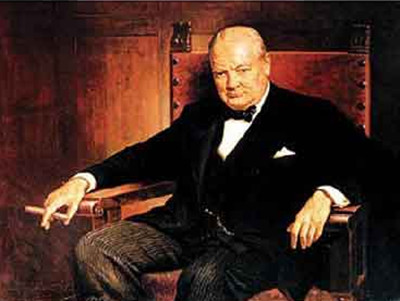Visiting Cuba in 1895, during its war of independence from Spain, he travelled unperturbed through some of the island's most dangerous territory while writing for the Daily Graphic.
1895年,丘吉爾到了正在為脫離西班牙統(tǒng)治而戰(zhàn)斗的古巴,他鎮(zhèn)定地穿過島上最危險的地區(qū),同時為《每日畫報》撰寫稿件。
The next year his regiment was transferred to India, where he fought Pushtun tribesmen on the border with Afghanistan, penning articles for the Daily Telegraph from a blood-splattered foxhole on the battlefield.
次年,他所在的軍團調(diào)往印度駐防,在印度與阿富汗接壤的地區(qū)與普什圖部落作戰(zhàn),在戰(zhàn)場上血跡斑斑的掩體里,他為《每日電訊報》寫通訊。
He was then sent to Sudan, where he took part in the British army's last great cavalry charge, at the Battle of Omdurman in 1898.
他隨后被派往蘇丹,在那里參加了1898年的恩圖曼戰(zhàn)役,這是英國陸軍歷史上最后一次騎兵沖鋒。
After narrowly losing a by-election in Oldham, he returned to the journalistic fray as a war correspondent in South Africa for the Morning Post during the second Boer war of 1899-1902.
丘吉爾在奧爾德姆選區(qū)的補選中以微弱差距落敗,此后回歸新聞記者的行列,在1899年至1902年的第二次布爾戰(zhàn)爭中,他擔任《晨報》駐南非的戰(zhàn)地記者。
There he hit the front pages in his own right; he was captured by the Boers while accompanying a scouting expedition on an armoured train.
他憑借自己的能力登上了報紙頭版;他跟隨偵察探險隊乘坐裝甲列車前進,被布爾人所俘獲。
Even that could not stop Churchill, who soon escaped from the prisoner-of-war camp, travelling almost 300 miles to safety in Portuguese East Africa.
即使被俘也無法阻止丘吉爾的腳步,他很快從戰(zhàn)俘營中逃脫,跋涉了近300英里的路程,安全抵達葡萄牙統(tǒng)治下的東非。
As Mr Read notes, by the time of his return from Africa, Churchill had saved more than 4,000 from his writing, equivalent to 400,000 today.
正如里德指出的那樣,從非洲返回英國的時候,丘吉爾通過寫作攢下了超過4000英鎊,相當于今天的40萬英鎊。
With judicious economy, he told his brother, I shall hope to make that carry me through the lean years.
憑借著精打細算,他告訴自己的兄弟,我指望這筆錢能讓我度過艱苦的歲月。
But he returned to old habits in the years to come.
但是他在此后的幾年里故態(tài)復萌。
Notable extravagances involved losing badly gambling in Monte Carlo and betting that share prices would continue to rise when the Wall Street crash hit.
值得一提的是,他的生活窮奢極欲,在蒙特卡洛賭博輸?shù)舸蠊P錢財,在華爾街大崩盤的時候押注股價會繼續(xù)上漲。

Churchill did not continue to write simply for adventure or fun;
丘吉爾繼續(xù)寫作不是為了冒險或樂趣,
he did so to make ends meet.
他這樣做只是為了糊口。
But even that was not enough.
但是即便如此也不夠。
He required bail-outs from wealthy friends in 1938, 1940 and 1946 to save him from bankruptcy.
在1938年、1940年和1946年,他需要富裕的朋友伸出援手,才能使他免于破產(chǎn)。
Both books manage to tell their tales of Churchill the adventurer and gambler elegantly.
兩本書都精心講述了丘吉爾身為冒險家和紳士賭徒的故事。
And for a financial biography, Mr Lough's is a surprising page-turner.
就金融傳記而言,戴維·洛的這本書引人入勝、令人驚嘆。
But the two authors only briefly link their assessments of Churchill's personality to the important decisions he made in office—and even then only in vague terms.
但是兩位作者只是草率地把他們對丘吉爾個性的判斷與他在政壇所做的重要決定聯(lián)系起來,甚至只是含糊其辭地談及此事。
For instance, both fail to mention how his frequent bouts of depression may have contributed to his impulsiveness and risk-taking.
比如說,兩本書都沒有提到,他經(jīng)常發(fā)作的抑郁癥可能是沖動和冒險行為的罪魁禍首。
Although their stories are worth telling, they have left bigger questions about Churchill to other historians.
雖然他們講述的故事頗為精彩,卻把關(guān)于丘吉爾的更多疑問留給其他歷史學家去解決。












